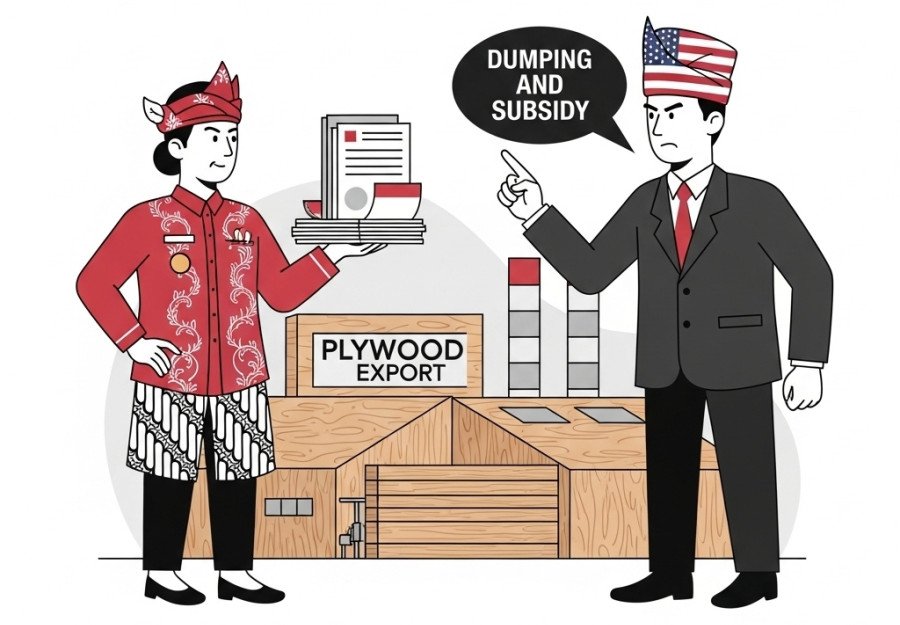Indonesian Government Rejects Baseless US CVD Allegations Against Plywood Industry
Indonesian Government Rejects Baseless US CVD Allegations Against Plywood Industry
- 10 Jul 2025, 13:49
Jakarta, APKINDONews – The Indonesian government has officially rejected allegations of subsidies from the United States concerning Indonesian plywood exports. In a formal consultation document dated June 5, 2025, the Ministry of Trade of the Republic of Indonesia firmly rebutted accusations made by a coalition of US industries in a Countervailing Duties (CVD) investigation petition.
The petition targets various Indonesian government programs, claiming they provide unfair advantages to the national plywood industry. A total of 11 national programs and 3 allegations of cross-border subsidies were cited in the petition.
The Indonesian government asserts that these accusations lack strong evidence, as stipulated in Articles 11.2 and 11.3 of the WTO Agreement on Subsidies and Countervailing Measures (SCM Agreement). According to the government, the allegations are merely assumptions and do not meet the criteria for an investigation.
One of the primary accusations is that Indonesia supplies log wood to domestic producers at unfairly low prices (less than adequate remuneration). The government refutes this, explaining that log wood prices are entirely determined by market mechanisms and no subsidies are provided to the plywood industry.
Allegations concerning the prohibition of log exports are also denied. The government emphasizes that the export ban is a forest conservation and environmentally oriented policy. This policy also supports the Indonesian Timber Legality Assurance System (SVLK) and does not provide financial benefits to businesses; rather, it aims to meet the requirements of importing countries like the EU and the Lacey Act in the US.
Regarding electricity tariffs, the government clarified that different rates apply based on user type and voltage. PLN, the national electricity provider, operates as a public service, not a specific subsidy program for the plywood industry.
The petition also mentioned tax holidays for pioneer industries. However, the government stresses that the plywood industry is not included in the list of pioneer sectors as per Minister of Finance Regulation No. 130/2020.
Other programs, such as industrial estate facilities, export financing from Exim Bank, and VAT or import duty exemptions, were also explained as not being specific or providing unfair advantages. These facilities are general in nature and accessible to all industrial sectors in Indonesia.
Notably, the government also rejected accusations of subsidies from the Chinese Government directed at Indonesian producers. The Indonesian government asserts it has no control over Chinese government policies and therefore should not be held responsible.
In the document, Indonesia requested the US government exclude certain plywood products from the investigation's scope. These include thin plywood with thicknesses of 2.7–3.4 mm and 4–6 mm, which, according to data, are not produced by the US industry and originate entirely from local Indonesian wood.
This resolute stance reflects the government's commitment to protecting national industries, especially the plywood sector, which is a cornerstone of Indonesia's non-oil and gas exports. This industry employs a significant workforce and has adopted global sustainability standards.
International trade observers suggest that such investigations risk leading to protectionism, which could distort global trade. Therefore, Indonesia advocates for an objective and transparent assessment from US authorities.
Should the investigation proceed without strong evidence, it could trigger new trade tensions and harm efficient and law-abiding Indonesian exporters.
The statement also highlights the importance of ongoing negotiations between Indonesia and the United States, particularly concerning reciprocal tariff schemes, sectoral tariffs, and cross-border cooperation to prevent circumvention practices. This reflects both countries' efforts to build a fairer, more transparent, and mutually beneficial trade relationship. By strengthening sector-based tariff arrangements and ensuring compliance with rules of origin, Indonesia hopes these steps will prevent baseless accusations in the future and foster equitable bilateral trade. Overall, the Indonesian government's stance underscores its seriousness in safeguarding strategic national industries. This move is expected to signal strongly that Indonesia will not remain silent when unfair trade policies threaten its domestic businesses.
The Indonesian plywood industry is now united, alongside the government, facing international pressure with data, legal arguments, and a spirit of economic nationalism.
With increasing global trade challenges, the role of the state in maintaining the sovereignty of strategic industries will become even more crucial. And in this case, Indonesia chooses to stand firm.(geo_rob)


